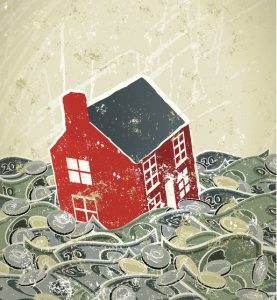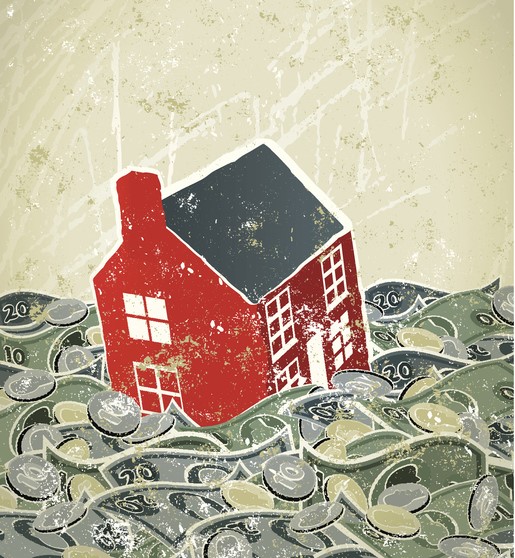Did banks delay foreclosures on delinquent mortgages in the districts of House Financial Services Committee members prior to the passage of the Dodd-Frank Act?

The global financial crisis of 2008 led to a sharp rise in mortgage foreclosures. As a highly visible symbol of the crisis, foreclosures attracted considerable attention from politicians, regulators, and the public at large.
For example, during a congressional hearing on February 10, 2009, Barney Frank, then chairman of the Financial Services Committee in the US House of Representatives, called for a moratorium on new foreclosure starts. “While we wait for President Obama’s plan,” Frank stated, “I call on institutions that hold or service mortgages to delay and stop any foreclosure proceedings. . . . In this situation where the Obama administration will have a specific plan shortly, a moratorium is clearly called for.”
In the aftermath of the crisis, the Financial Services Committee was also asking tough questions about the origins of the crisis, how it propagated through the financial system, who were the main players in causing it (banks, borrowers, regulators, rating agencies, etc.), and what new regulations might help avoid future banking crises. The process of new regulatory changes started on June 17, 2009, in the House and Senate Financial Services Committees and resulted in the Dodd-Frank Wall Street Reform and Consumer Protection Act, signed into law on July 21, 2010, by President Obama. Dodd-Frank considerably reshaped the financial sector and the ability of banks to engage in lending practices they had used before the crisis. Specifically, 2 of the 15 Dodd-Frank provisions with direct implications for mortgage lending were the creation of the Consumer Financial Protection Bureau (Title X) and the Mortgage Reform and Anti-Predatory Lending Act (Title XIV).
It was therefore natural that banks would have political concerns about these exact provisions and how this could impact their profitability and shareholder value. If they wanted to try to reshape and water down the Dodd-Frank Act, they would have to do so while the bill was being debated in Congress. One potential mechanism to do so would be through lowering the number of foreclosures initiated in the districts of Dodd-Frank committee members so that the committee members wouldn’t hear complaints from their constituents about the hardship of the mortgage crisis and would be more lenient during the debate on the bill.
“Mortgage-servicing banks did indeed delay the start of foreclosures on delinquent loans if those loans were located in the electoral districts of House Financial Services Committee members.” |
One might argue that this is an awfully complicated and cumbersome way to influence politicians. Traditionally, banks try to influence politicians directly through campaign contributions and lobbying. For example, the top 10 mortgage servicers, which include some of the largest financial institutions like Bank of America, Citigroup, JPMorgan, and Wells Fargo, collectively spent about $44 million during this period in lobbying both the legislative and executive branches, not just committee members. The combined campaign contributions to the committee members by these mortgage servicers’ political action committees were about $1 million. However, it is conceivable that if the cost of delaying foreclosure starts were on the same order of magnitude then it might be worth spending the additional money.
Moreover, lowering foreclosure starts could also help the politicians show their constituents that they are doing something to help them. There are other conceivable reasons banks might have lowered foreclosure starts during the passage of the Dodd-Frank Act. These delays may help politicians who have a reputation for being sympathetic to the banks’ perspective to get reelected. The politicians themselves might pressure the banks for leniency on delinquent borrowers in their district, as the quote above from Barney Frank suggests.
In a recent paper with Gene Amromin, Zahi Ben-David, and Serdar Dinc, I focused on this specific question: whether banks delayed foreclosure initiation on delinquent mortgages in the districts of House Financial Services Committee members during 2009–10 when the Dodd-Frank Act was being debated. We used institutional details of the US Congress in our test design. For example, given the importance of seniority in Congressional committees, incumbents tend to stay on the same committee for multiple terms. Hence, most members made the decision to be on the Financial Services Committee long before the financial crisis. The foreclosure process on delinquent loans starts only when lender—or its agent, the loan servicer—takes explicit action; therefore, the start of the foreclosure process is largely discretionary and can be delayed.
We found that mortgage-servicing banks did indeed delay the start of foreclosures on delinquent loans if those loans were located in the electoral districts of House Financial Services Committee members. Importantly, there was no difference in delinquency rates in committee districts so this differential delay cannot be attributed to servicers’ capacity constraints under a large volume of delinquent loans. These results are robust to many loan- and location-specific controls, some of which are time-varying (e.g., zip code–level house price changes), as well as any state-specific time effects.
The average time for foreclosure starts in non-committee districts is about 12 months, taking into account the right-censoring at the sample end. In committee districts, however, this average is about half a month longer. Based on the foreclosure cost estimates from the literature and using only the aggregate value of delinquent loans in our sample, we conservatively estimate the direct cost of delay to lenders to be about $30 million. Although this cost may be small in the context of the mortgage market, it should be judged relative to other political actions by the large banks, as I mention them above. After all, the importance of banks’ political activities is not captured by the direct impact of their cost on bank earnings but rather through their potential to influence the political process.
Delaying foreclosure starts is a novel channel for banks to influence the political process. Despite the similarities of its cost to the lobbying expenses by these servicers, there are also differences compared to lobbying and making campaign contributions. By law, lobbying expenditures cannot be channeled to politicians’ campaigns. These delays, on the other hand, directly benefit the constituents of committee members. Campaign contributions can, of course, be used in the politicians’ campaigns but the foreclosure delays may be able to target the politicians’ voters even more precisely than some of the campaigning paid for by contributions.
We verified that our results are not spurious through a variety of tests. As placebo tests, we checked the membership in the Transportation and Infrastructure and Defense committees and find no link between membership in either of those two committees and the timing of foreclosures. We also did not find any effect of the Financial Services Committee membership in the earlier years when foreclosures did not attract as much attention.
To address the concerns that legislators may self-select into the Financial Services Committee based on the delinquency rates of their constituents, we checked the robustness of our results by restricting our sample to legislators who were elected to the House and to the Financial Services committee before 2005, well before the onset of the crisis.
Our paper does not focus and does not provide any evidence on what the banks received in return for delaying foreclosures or if the banks engaged in other such activities like increasing the modification rates in these districts. We leave these questions for future research.
Sumit Agarwal is William G. Droms Term Professor of Finance at the McDonough School of Business and a Professor of Economics (courtesy appointment) at Georgetown University.
Disclaimer: The ProMarket blog is dedicated to discussing how competition tends to be subverted by special interests. The posts represent the opinions of their writers, not those of the University of Chicago, the Booth School of Business, or its faculty. For more information, please visit ProMarket Blog Policy.






